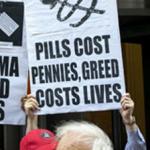Nicole Smith-Holt’s son Alec died in Minnesota last June--after being forced to ration Eli Lilly’s Humalog insulin when Alec, a person with type 1 diabetes, could not afford the radically-increased price of the medicine. Ms. Smith-Holt wrote about Alec’s experiences in this February article. PFAM supported Ms. Smith-Holt as she attended the Eli Lilly shareholder meeting on May 7th...
Drug prices are skyrocketing in the US, and eye-watering Big Pharma profits are rising right along with them. With millions of Americans skipping medicine doses due to cost, widespread public frustration has spurred lawmakers to propose some good ideas for addressing the crisis.
During the January 2003 State of the Union address, President George W. Bush announced the President’s Emergency Plan for AIDS Relief, a landmark treatment program. As Bush spoke, the cameras panned to a smiling guest of honor standing to the right of First Lady Laura Bush. The guest was Ugandan physician Dr. Peter Mugyenyi, and he was an illegal importer of medicines.
The pharmaceutical industry has a massive public relations problem, and it knows it. Even an unapologetically pro-corporate President says drug companies are “getting away with murder.” Americans name prescription drug prices as a top concern, and a January poll showed only 9% of people in the U.S. feel that those companies prioritize patients over profits.
Enormous public frustration with the skyrocketing prices of essential medicines in the US has not yet led to any meaningful reform. But a historic initiative on the November ballot in California, championed by health care and consumer advocates and fiercely opposed by multinational drug corporations, may finally rein in Big Pharma.
Don Reichmuth survived prostate cancer once before, back in 2007, so his physician was concerned when tests recently revealed the cancer had returned. Reichmuth's physician prescribed a drug called enzalutamide, marketed by the Japanese company Astellas Pharma, Inc. under the brand name Xtandi. But when the physician sent the prescription to the pharmacy, the managers of Reichmuth's insurance plan sent back an immediate refusal to approve it.
Reichmuth, a retired teacher who lives in Washington State, was puzzled by the logic. Then he learned the price of the Xtandi prescription: over $9,700 each month.






